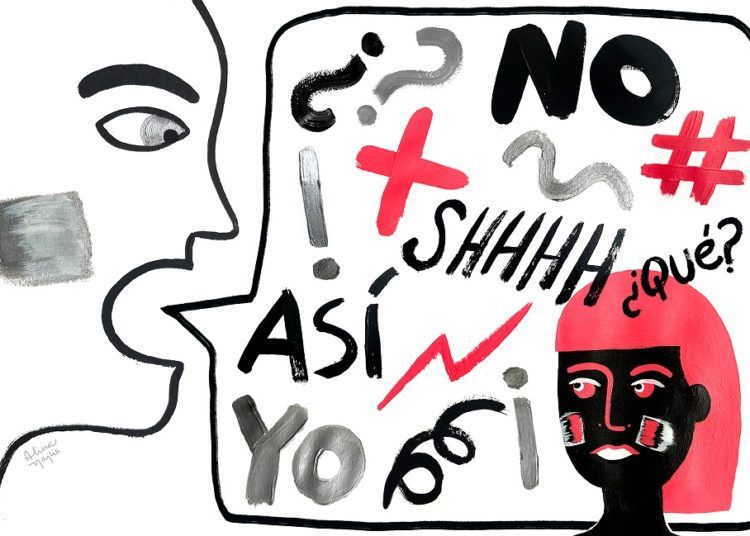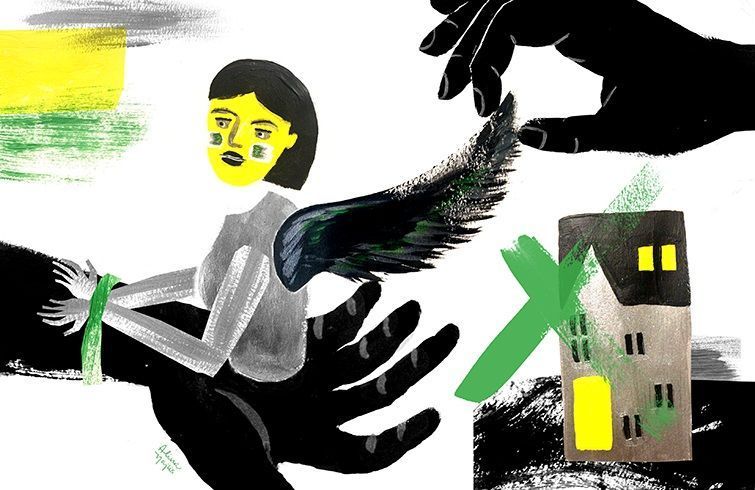The neoconservative field represents an evolution and mutation of traditional Latin American conservatism. It still clings strongly to the Christian tradition, professing to defend a “natural” order, moralizing the public sphere, and perpetuating various political, social and economic hierarchies (Romero, 2000). However, we also find counterattacks and revamped agendas—many related to promoting so-called sexual morals and attacking gender equality—, alliances between Catholics and evangelicals, reconfigured strategies for achieving political influence, the expansion of transnational networks, and a spilling of religious action beyond the church in the form of “religious citizenship”, among other features.
Women’s rights and sexual and gender diversity have played a major role in this scenario. Things have changed starkly on this matter in recent years, and nowadays every government and political group is expected to address these issues as a fundamental element of their politics, making them key factors in defining the conservative, authoritarian, or progressive calibre of the actors involved. Gender issues serve as a kind of “symbolic glue” for different agendas and political affiliations.
Neoconservatisms with an explicit or veiled religious core—whether connected to the Vatican or to the expansion of different forms of evangelicalism—have become increasingly important. Their work and their (contingent but important) alliances with non-religious political actors and spaces that are not openly religious but equally conservative—both on the (far) right and in neoliberal circles—are spreading throughout the region. And their agenda is either explicitly or de facto anti-feminist. The Vatican responded early to the expansion of women’s rights (becoming particularly vocal on the matter since the 1990s), warning about the dangers that feminist theory posed for humanity and Christianity. Despite its own divisions, evangelicalism has gone in the same direction.
The most visible agenda of these new conservatisms with respect to women and LGBTIQ+ communities has to do with the regulation of sexual morals: they are against abortion, sexual education, and LGBTIQ+ rights, and in favour of reinstating traditional models of the family. However, they have a broader programme and have played an important role in events such as the last Brazilian election, Colombia’s peace referendum, and the row over Paraguay’s gender equality law. It is therefore essential to assess this programme in its entirety.
Latin American neoconservativisms (both religious and secular) make use of at least three rhetorical and political tropes: freedom, life, and the family. Analysing these concepts allows us to examine the political logic of these movements, in order to better understand the results of their actions, and to delve deeper into the resources that help them expand their base, as well as into the connections between secular and religion-based politics. This triad is responsible for their powerful political logic.
The neoconservative triad
The triad composed by freedom, family, and life appears in the names and the content of national and international neoconservative organizations.
The Alliance Defending Freedom, a Christian organization founded in the United States in 1994 which has a presence right across Latin America, says, for example, that it advocates for “religious liberty, the sanctity of human life, freedom of speech, and marriage and family”.
In Argentina, the Partido Celeste (Sky-Blue Party), which emerged in response to the advance of feminism and its defence of sexual and reproductive rights (SHRH) for all, says that it “aims to promote the family as the core and the basis of society by rejecting gender ideology, fostering greater respect for family values, promoting the value of all life, and respecting freedom” (Loza y López, 2020).
One of the main focuses of evangelical political action in Ecuador has been the consequences of the separation of church and state, and of “anti-Christian laws and practices against life, family, and freedom of conscience” (Salazar, 2020). Likewise, the Coordinadora Nacional de Vida, Familia y Libertad (National Coordinating Committee for Life, Family, and Freedom) is an ecumenical organization that brings together many different groups in Ecuador, including “pro-life/pro-family” groups, indigenous and mestizo neo-pentecostal churches, conservative activists, and Catholic integralist groups (Salazar, 2020). While in Colombia, religious and non-religious neoconservative elites accuse feminists and LGBTIQ+ activists of lobbying against the rights of the family (Escobar, 2020).
In Bolivia, the organization Plataforma por la Vida y la Familia(Platform for Life and Family), created in 2012, advocates for the “defence of life from conception until natural death, of the family as the foundation of society, the right of parents to raise their children, and religious freedom”. The first National Convention for Life, organised by the platform in 2019, confirmed its commitment to promoting public policies that protect “life, the family, freedom, and the common good of all Bolivians” (Díaz, 2020).
In Cuba, the dispute over the constitutional reforms of 2018–2019 brought the actions of religious neoconservatives to the fore, highlighting their efforts to set the course of the country in coming years. At the time, these actors reiterated a narrative of defending the freedom of the majority against the “imposition of gender by minorities”, and the protection of the “original design of the family”, children, and the freedom of parents to educate their children according to their values (Morales, 2020).
In Mexico, far-right groups—including religious and business groups and their alliances with actual political organizations—have opposed the depenalization of abortion, sexual freedoms, and have vehemently targeted LGTBQ+ communities. Gender hierarchy and the traditional family are part of their agenda.
I could mention many more examples to illustrate how life, family, and freedom are fundamental elements of the neoconservative matrix. However, in this context, every element of the triad has very specific meanings. Freedom, family, and life are not unambiguous signifiers that can be simply deployed. Rather, the issue of how to define them is at the very heart of the dispute. Only once they have been defined can their forms of existence, classification, and regulation be addressed.
Freedom
Neoconservatisms that assert a form of religious citizenship defend their public utterances under the guise of freedom of speech, freedom of religion, and individual liberties.
Appealing to universal rights (such as the right to freedom of speech and religion) is part of these actors’ operational framework. The rhetoric of human rights— previously used by social movements and collective actors demanding the democratization of the public sphere—is given a new meaning in the service of their agenda.
At the same time, they fiercely defend individual liberties, which they portray as opposed to the actions of the state in order to satisfy their own interests. Some of these actors strategically raise strong—and baseless—suspicions against the state, linking the protection of sexual and reproductive health and rights to state interventionism, which they describe as Marxist or communist. According to this narrative, by promoting such rights, governments, feminists and LGBTIQ+ communities threaten individual liberties. Meanwhile, issues such as forced pregnancies, sexual slavery, human trafficking, and sexual violence are ignored as if they had no effect on people’s freedoms.
During the pandemic, religious neoconservatives have invoked the notion of freedom (of speech, of worship, and of the individual) in their campaigns. In several Latin American countries, pastors and leaders of different ministries (both evangelical and Catholic) opposed the restrictions on mobility and the temporary suspension of religious services ordered by the governments.
In Brazil, Silas Malafaia, a pastor from the Assemblies of God denomination with a large following on social and traditional media platforms, and with strong influence in the National Congress, spoke out against social distancing. In addition, evangelical groups have condemned government measures as a threat to their religious freedoms. The Evangelical Parliamentary Front managed to get churches recognized as essential services.
In Chile, evangelical organizations from the Biobío region announced that they were going to take the government to the Inter-American Commission on Human Rights, accusing it of violating religious freedoms through the measures to contain the pandemic.
Seventeen authors joined the publication Pandemonium: ¿de la pandemia al control total? (Pandemonium: From the Pandemic to Total Control?), edited by the Argentinian-Mexican neoconservative Carlos Beltramo. In his prologue, Beltramo argues that the left is trying to interpret the pandemic as a confirmation of its progressive thesis, but that “totalitarian states will not get us out of the crisis”.
The way these actors defend freedom and oppose what they view as state intervention deserves two additional comments.
Firstly, they defend a specific kind of freedom: an individual and negative freedom, similar to that of doctrinal liberalism—and thus a kind of updated version of neoliberalism. This vision of freedom is defined as a lack of interference in the life of the subject. A person is free when nobody can interfere in their life. This is a radically antidemocratic argument, as guaranteeing social, political, and civil rights requires state interference (through taxes, redistributive policies, labour laws, affirmative action policies, and the like). Such interference cannot be arbitrary, of course; it must be based on democratic agreements. But then the problem would not be interference as such, but arbitrariness.
A different way of understanding freedom that has democratic outcomes is as non-domination. A person is free when the bonds of domination (in the workplace, at the hands of political institutions, in the domestic sphere or through material inequalities) that reproduce subordination have been broken. If freedom is understood as non-interference, it does not address the relations of exploitation and oppression that shape society, thus reproducing subordination and dependence. As such, it is an artificial freedom.
Secondly, neoconservativisms reject state intervention as an attack on freedom, while at the same time pushing to gain influence within the state. They do not want to abolish the state because it hinders individual freedom but rather the opposite: they want to occupy the state because they view it as a vital ground for their “spiritual war”. Therefore, the freedom that this agenda stands for is fictional in programmatic terms. We should remember that the same goes for neoliberalism: it advocates shrinking the state, but what it really does is change the character of the state by transfiguring its apparatus into a corporate one. As a matter of fact, the idea of freedom defended by religious neoconservatives fits perfectly with the neoliberal matrix. These links are increasingly being studied (see, for example, Kali (2020) and Morán and Peñas (2020)).
Family
The neoconservative programme has its sights set on a reinstatement of the traditional family unit, a return to a heterosexual, nuclear family, which is led by a man and follows the model of the male provider/female care-giver. The possibility of changing this kind of family is presented as a fearful sin.
During the debate on the Gender Identity Bill (2017) in Chile, the Spanish organization HazteOír (Make Yourself Heard), part of the group CitizenGo, brought its “freedom bus” to put pressure on congress to reject the bill. The bus read “Less Government More Family”. According to this vision, the family (like freedom) is endangered by supposed state interventionism, which goes against its exclusive and exclusionary power to provide moral education to minors.
One of the most powerful organizations pursuing this agenda is Con Mis Hijos No Te Metas (Don’t Mess with my Children), an umbrella group bringing together Catholic, evangelical, and secular activists, that began operating in the region in 2016, with Peru as its first port of call. Nowadays, it is present in a range of countries in the region, including Ecuador, Brazil, Argentina, Bolivia, Mexico, and Uruguay.
Con Mis Hijos No Te Metas has succeeded in blocking laws and policies related to sex education in all the countries in which it is active. They are present on social media and are very successful at mobilizing groups that support their agenda. They first emerged in Peru, campaigning against the implementation of a new National Curriculum for Primary Education by the Ministry of Education. They claimed that it introduced what they described as a false and dangerous “gender ideology” to schools, which according to them could influence minors to believe that they could pick their sexuality, even though it is defined by biology.
In Colombia, the group has led campaigns against same-sex adoptions and sex education. In Argentina it has been organizing demonstrations and lobbying since 2018, again in opposition to “gender ideology” and the country’s National Programme of Comprehensive Sex Education. In Ecuador, it has been organizing protests since 2017. In 2018 the group rallied against a Constitutional Court ruling on the inalienable right of children and adolescents to receive sex education, make autonomous decisions regarding their sexual health, and to express their opinion and consent directly without the illegitimate interference of the state, society, or their families, pushing the National Assembly to approve a resolution that “ratifies the defence of the family as the fundamental core of society”. In Chile, the spokesperson of the movement condemned the draft of the Law of Rights for Children, arguing that it “compromises the leading role and the preferential right of parents to educate their children about values”.
Throughout the region, these actors are building alliances and coming together to form platforms with large audiences. The most important of these networks is the Congreso Iberoamericano por la Vida y la Familia (Ibero-American Congress for Life and the Family), an organization created in 2017 by the Mexican pastor and journalist, Aarón Lara, which brings together politicians and Christian activists.
The plan to reinstate the traditional family has moved forward during the pandemic. The isolation brought by lockdowns has been helpful for indoctrinating people about traditional family roles and the value of the “original family” through (digital) religious services and pamphlets that teach women how to be good housewives. In the aforementioned publication Pandemonium, the German author Birgit Kelle argues that “women are home now and therefore beyond control, and that is perhaps the best news regarding the coronavirus pandemic”, and that what the feminist movement calls the “horrible re-traditionalization” is its worst fear. “A mother is and will continue to be the number-one problem for the feminist movement”, she concludes.
In Peru, neoconservative activists campaigned on the country’s Family Day, and Guillermo and Milagros Aguayos, leaders of the church La Casa del Padre, promoters of Con Mis Hijos… and founders of the groups Salvemos a la Familia (Let’s Save the Family) and Centro para el Desarrollo de la Familia (Centre for the Development of Family), have taken advantage of the lockdown to teach a course that reinforces rigid gender roles, which they call a “Degree in Family Counselling”.
This agenda has sought to privatize the domestic realm and place it beyond the sphere of politics, in order to naturalize forms of subordination and dependency that can only be challenged through politics. The family ceases to be a private space when it is politicized, allowing other (institutional) agents to intervene in a non-arbitrary manner to ensure the defence of the rights of those who need it—for example, victims of domestic violence. The neoconservative agenda is just the opposite.
Religious neoconservatisms are not alone in this. Neoliberalism and corporate states also privatize the family sphere when they delegate full responsibility for the welfare of their citizens. Welfare regimes based on the family are the model for making the domestic space into a private space in order to divest the state from any responsibility.
Life
The dispute over the meaning of life has been studied more thoroughly. Religious neoconservatives have secularized their defence of life: they claim that, from a biological perspective, life begins at conception. In its “Declaration on Abortion” (1974), the Vatican argued that the zygote constitutes the first cell with a unique and unrepeatable genetic identity, and that this information will be in all the cells of the embryo, the foetus, and the human being that emerges from them. For this reason, the interruption of a pregnancy would be an attack on life, a homicide.
Alongside this genetic framework, the moral demands of conservatives with regard to the sanctity of life are usually formulated in the language of rights. The protection of life from conception is a human right, since only when the right to life is guaranteed can people enjoy other rights. The rhetorical juxtaposition of life and rights is an example of “strategic secularism”, in which religious actors use secular language and concepts to optimize their moral and political legitimacy.
At the same time, religious neoconservative rhetoric distances itself from the agendas that were informed by liberation theology, which affirmed life in relation to social justice and denounced torture and abuse. In contrast, the neoconservative defence of life has focused on objecting to the sexual and reproductive health and rights of women and LGBTIQ+ communities, either through direct religious action or through NGOs and secular organizations that secularize the agenda. In the latter case, religion takes a back seat, loosening the links between the so-called “pro-life” movements and church leaders. This is the case, for example, with the Red Federal de Familias (Federal Network of Families) in Argentina, as José Manuel Morán Faúndes has analysed in detail.
While feminists and LGBTIQ+ communities have politicized sexuality and life, neoconservativisms re-naturalize them, and they do so in part by invoking life’s counterpart: death.
In 2019, the neoconservative opposition to the Ecuadorian Health Code was presented as a rejection of the “Organic Code of Death”, because the code included articles related to abortion in the event of obstetric emergencies. In Colombia, neoconservatives have portrayed feminist and LGBTIQ+ struggles as a defence of a “culture of death”. And in Costa Rica, they have described political parties with pro-SHRH positions as the “death combo”.
The neoconservative bastion of life continues to assert control over people and bodies, and in particular, over women. In several countries in the region neoconservatives have tried to, and sometimes succeeded in, pushing through constitutional amendments that protect life from the moment of conception and increase the penalty for abortion, which is already recognized as a crime.
Neoconservativisms during the crisis
During the current crisis brought about by the pandemic, religious neoconservativisms have remained active. They are consolidating and refocusing their strategies as they continue to expand.
In addition to the activities I have already outlined above, neoconservative groups have been key actors in the creation and dissemination of fake news and conspiracy theories related to the virus. They have accused national and international social actors (including feminist groups) of being responsible for COVID-19, and, with the support of radically different governments such as those of Brazil and Mexico, have contributed to the consolidation of a denialist rhetoric about the crisis. Furthermore, they have disseminated fake remedies, criticized physical distancing measures, and advocated for resolving the crisis through fasting and prayer—something that was also suggested by leaders such as Jeanine Áñez, the former president of Bolivia. At the same time, they have continued their efforts to broaden their bases and to increase their influence within official institutions. Their existence as a political force is vital to understanding Latin America today.
However, the religious field is not entirely neoconservative. Catholics and evangelicals are also involved in efforts to defend rights—think, for example, of the organization Católicas por el Derecho a Decidir (Catholic Women for Freedom of Choice). Nor are all neoconservatives religious, as I have already mentioned. What matters is that we identify, analyse, and challenge political groupings in terms of the content of their statements, their contradictions, and their activities.
The anti-feminist framework of Latin American neoconservativisms is a point of fact. No narrative or policy that curtails rights is neutral with regard to inequality. And inequality is the central issue of feminist activism, as all feminisms fight for freedom, life, and families, but they do so according to a democratic politics.
[This article was originally published in Spanish at Revista Común]
[Translated by Andrea Garcés & Joel Scott for Gegensatz Translation Collective]
References
Díaz, M.A. (2020) “La Plataforma por la Vida y la Familia en Bolivia”, in Torres, A. (ed), “Derechos en riesgo en América Latina: 11 estudios sobre grupos neoconservadores”, Rosa-Luxemburg-Stiftung/Desde Abajo, pp.139–158.
Escobar, M.R. (2020) ““Lo que está en juego es la vida”: sobre “ideología de género”, religión y política en Colombia”, in Torres, A. (ed) op. cit., pp. 117–138.
Kalil, I. (2020) “Políticas antiderechos en Brasil: neoliberalismo y neoconservadurismo en el gobierno de Bolsonaro”, en Torres, A. (ed) op. cit., pp.35–54
Loza, J. y López, M. (2020) “Representaciones y repertorios de expresiones conservadoras organizadas contra el aborto en Argentina (2018–2020)”, in Torres, A. (ed.) op. cit., pp. 55–74.
Morales, L. (2020) “¿Fundamentalismo religioso o grupos antiderechos en Cuba? La agenda contra el matrimonio igualitario (2018–2019)”, in Torres, A. (ed) op. cit., pp. 201–222.
Morán, J.M. and Peñas, M.A. (2020) “Una mirada regional de las articulaciones neoconservadoras”, in Torres, A. (ed.) op.cit., pp. 241–275.
Romero, J. (2000). “Prólogo”. In J. Romero y L. Romero (Comps.), Pensamiento Conservador 1815–1898, pp. 1–38. Biblioteca Ayacucho.
Salazar, J. (2020) “La doble vía entre lo local y lo transnacional: el activismo evangélico conservador en Ecuador y sus vínculos con la agenda internacional “antigénero””, in Torres, A. (ed.) op. cit., pp. 75–96.
Este texto fue publicado en IRGAC: https://www.irgac.org/2021/02/04/latin-american-neoconservatisms-and-antifeminism-freedom-family-and-life/
Créditos de la imagen:
• Foto del autor Julio César Guanche
Créditos de la imagen destacada:
• Foto del autor Julio César Guanche





